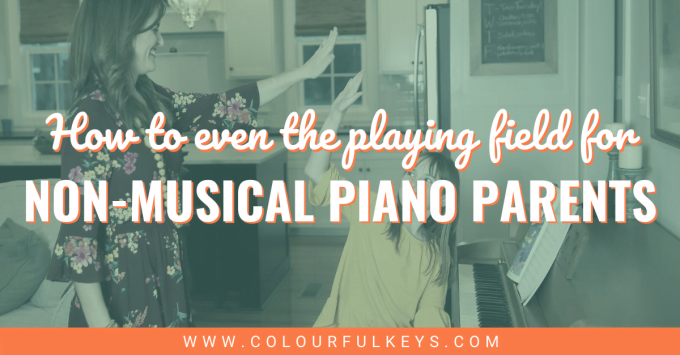One of our core values at Colourful Keys is that music should be accessible to everyone, regardless of their background. I think that most teachers would agree with this sentiment, and I’m sure you do too. But most of us are falling short in helping piano students with non-musical parents succeed.

I hate to even use that phrase, “non-musical”. Because, of course, everyone is musical, right?
What we’re talking about here is simply those who haven’t studied an instrument themselves. Failing to help those parents who don’t have a musical background is one of the key ways you might be making your studio exclusive while believing you’re as inclusive as can be.
Your studio is exclusive
What’s that I hear?
Not MY studio. I welcome students of aaaaaall backgrounds.
Most of us think we do, but the evidence is clear. When I ask a room full of teachers how many of them had parents who studied a music instrument, about 80% of hands go up. I’m guessing the number would be the same for performers, too.
So, we may think we’re inclusive, but the results speak for themselves. The students who make it through – the ones who take music further – are overwhelmingly from musical families.
If we don’t turn this tide, our community is going to shrink generation-by-generation.
Pssst…I devote an entire section of my Studio Business page to working with parents. After you’ve read this article, hop over there for more tips!
4 Ways to Help Non-Musical Parents
Fortunately, it’s pretty simple to fix this issue if you focus on it. (Notice I said simple, not easy!)

Step 1: Question your assumptions
You have the curse of knowledge.
Education is fantastic. But at some stage, it makes us blind to what is common sense and what is learned.
We think that it’s obvious that…
- A keyboard isn’t a piano
- A dining room chair is not a piano bench
- Writing the note names on the keys is counter-productive
- Practice requires parental support
But all of these are learned facts. We didn’t get them from being out in the world.
We got them from being in this elite club called “musicians”.
So at every step of our piano students’ journeys, we need to be asking ourselves whether we have made any assumptions about what we call common sense. Because normally, it’s not common at all.
Step 2: Cut the jargon
At some stage of your life, I’m sure you received a letter that made your eyebrows crinkle as you tried to understand it’s looping and jargon-filled language. Maybe it was from a lawyer, or perhaps from a bank. 🤨
How did that letter make you feel?
STUPID.
Do you want your non-musical piano parents to feel that way? Do you think they’re going to stick around if they do?
No and no.
So the next time you’re sending out an email, article, text or letter, do a plain English check. Could an average 12-year-old read and understand it?
If not, make it simpler. Your non-musical piano parents will appreciate it.
Step 3: Boost non-musical piano parents’ confidence
Many parents who didn’t study music have some emotional baggage around that fact.

- They always wanted to learn piano but their family couldn’t afford it.
- They’ve always believed themselves to be tone-deaf, or without talent.
- They started lessons but struggled because their parents didn’t study music. (Note the vicious cycle that’s about to happen here!)
We need to boost their confidence about the help they can provide their child. They might not understand the dots on the page, but they do have one very important skill: They are an adult.
I make it very clear at the first meeting with a new piano family that the things they can help with most are all about organisation. I encourage them to get in these habits right away:
- Read the assignments together after the lesson
- Sit together for practice time (not forever, but for as long as it’s beneficial) and view it as quality time they spend together
- Build practice into their daily routine
These things do not require musical knowledge and they will build the confidence of non-musical piano parents as they see how much it helps their kiddo to be there and talk things through together.
Step 4: Educate on autopilot
If you leave it up to your in-the-moment-self to explain things as they come up, you’re setting yourself and your non-musical piano parents up for failure.
You might tell one parent about bench height, and mention the recital dress-code to another. But it won’t be consistent.
The parents who studied music will be able to fill in the blanks, but those who didn’t won’t have the prior knowledge necessary to do so.
What you need is a repeatable system so that everyone is educated on the important details about your studio and your non-musical piano parents aren’t left on the back foot.
This is why I love the idea of an automated email sequence for your new piano parents. It might sound like an inhuman way to communicate, but it will help make things fair and equal for everyone – and what could be more human than that?
Members of Vibrant Music Teaching can access my own email sequence to use it as a starting point, along with a video tutorial which shows you how to set this up for free using Mailerlite.
Set it up once and you could help your non-musical piano parents succeed for years to come.
(Psst…Not a member? Learn more and sign up today for instant access to my email sequence and tutorial, along with loads of other valuable resources!)
How do you help your non-musical piano parents succeed?
Do you have any tricks on how to help piano parents in your studio? Are there any assumptions you’ve made in the past because of your curse of knowledge?
Let’s share our ideas below so that we can bring more families into our community. 🙂
Hi Nicola
What a great topic!
I pity the parents who feel more stupid than their kids. It is not logical because we have to know more than our children. Parents often regret « not being able to play the piano. » « Being not able to learn something at 30 years old is sad and not true.
I was thinking of a group lesson for parents; they could build a community and recover from their complex. I could teach them the basics of reading music ( I have a wonderful story for my grand staff carpet making it easy ) ; even with simple chords , they could play a P0p song.. This has probably already be done.
As always, you have insights that far surpass anything that I’m thinking. I always take your recommendations seriously, and already have in mind my own drip series based on this same recommendation from your studio marketing course. Thanks!
Let me know how you go putting it into action, Broc!